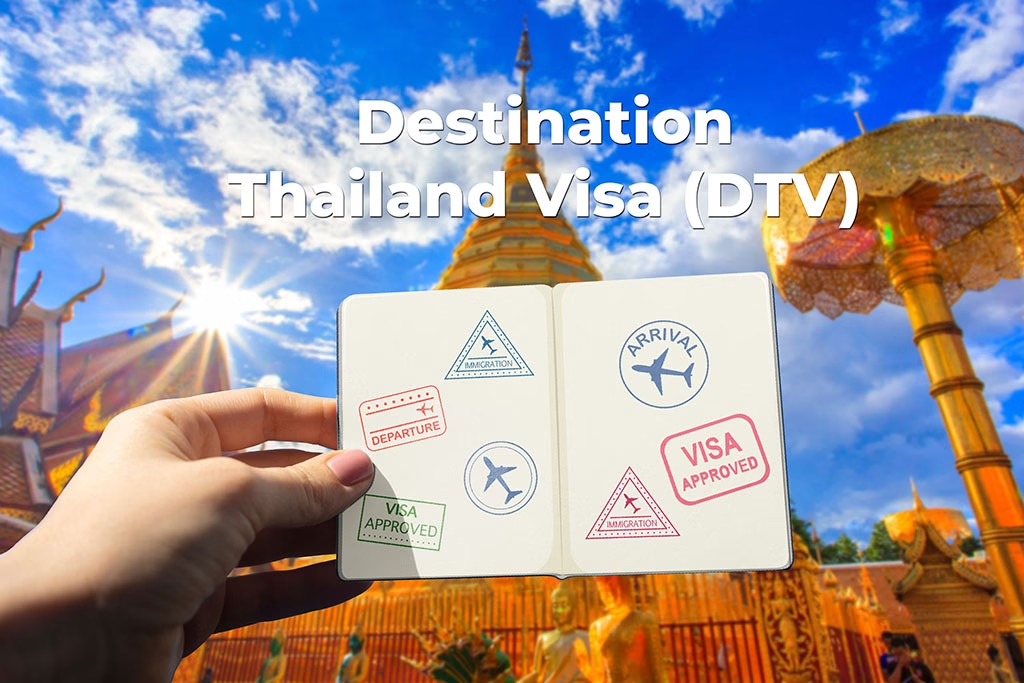BANGKOK – Thailand has refreshed and upgraded its Destination Thailand Visa (DTV), the main long-stay visa aimed at digital nomads and location-independent workers, with the latest updates in late 2025.
Often called the “Digital Nomad Visa”, the DTV now comes with smoother online systems and better options for families, which makes Thailand even more attractive for freelancers, remote employees, and online business owners looking to swap office lights for palm trees.
Remote work continues to grow after the pandemic, and Thailand is leaning into that trend. The government has set a bold target to host one million digital nomads by 2027, a move that is expected to pump more long-term spending into its tourism-focused economy.
Introduced in July 2024, the DTV quickly became popular. It offered a five-year multiple-entry visa that let people use Thailand as a long-term base. Updates through 2025, such as the Thailand Digital Arrival Card (TDAC) for all travellers from 1 May and a faster e visa rollout at Thai embassies worldwide, have helped clear early snags like long queues and in-person paperwork.
Officials say many of the improvements come straight from user feedback. Early applicants liked the flexibility of the visa but were less happy about the cumbersome procedures. Tourism and Sports Minister Phiphat Ratchakitprakarn summed it up at a Bangkok press event, saying Thailand is shifting from a short holiday spot to a serious hub for the future of work. The recent changes have shortened processing times as well, in some cases to around two weeks.
For remote workers tired of back-to-back visa runs and endless tourist stamp extensions, the DTV feels like a relief. It clearly allows remote work for companies and clients outside Thailand, which removes the need for a separate Thai work permit. This is very different from a standard tourist visa, which does not permit work, even if the employer is abroad.
An American software developer who recently moved to Chiang Mai described the change simply. Before the DTV, he was living on 60-day extensions and always felt one step from trouble at immigration. With the new visa, he can sit in a café and focus on his code instead of the calendar.

Updated Thai Digital Nomad Visa: Key Details
At its heart, the Destination Thailand Visa is a non-immigrant visa designed for people who want to combine work and travel. That covers digital nomads, freelancers, online entrepreneurs, and visitors who plan to take part in Thai cultural activities such as long-term Muay Thai training or cooking courses under the wider “Thai Soft Power” push.
The visa is valid for five years from the date of issue and allows multiple entries. Each entry permits a stay of up to 180 days. Holders can then request one more extension of 180 days at a local immigration office, so a single entry can stretch close to a full year.
Family options have improved as well. Legal spouses and children under 20 can join as dependents and receive their own visa stamps. This makes it easier for couples and families to settle for longer stays without juggling separate visa types.
The DTV also moves away from strict high-income rules that left out many younger or early-stage freelancers. The focus sits more on proof of stable funds than on a very high salary figure. For many digital nomads, one of the biggest advantages is tax treatment.
Income earned from abroad remains tax-free in Thailand in many cases, which can help avoid double taxation. However, anyone staying more than 180 days in a year may fall under Thai tax residency rules, so many long stayers now speak to an accountant before they commit to a full year.
The core idea of the visa is simple. Digital nomads spend money on rent, food, transport, gyms, cafés, and co-working spaces, which supports the local economy. In return, they agree not to work for Thai employers or compete in the local job market.
In areas like Bangkok, Chiang Mai, Chiang Rai, and Phuket, co-working spaces are busy all week. Cafés are full of people on calls with teams from Europe, North America, and beyond. Ancient temples sit a short walk from modern spaces with fibre internet, which creates a mix of old and new that appeals to a lot of remote workers.
Full details and small rule changes appear first on the official Thai e-Visa portal. Many experienced nomads now keep that site bookmarked and compare it with the Thai Immigration Bureau guidelines in case of small updates.

Eligibility: Who Can Apply For The Destination Thailand Visa?
The DTV is not completely open to everyone, but the entry bar is still lower than many European digital nomad visas. Applicants must be at least 20 years old and a citizen of one of 93 listed countries, stretching from Andorra to Zambia.
Proof of remote work is the backbone of the application. That proof can be:
- A letter from a foreign employer that confirms remote work
- Contracts that show ongoing freelance work for non-Thai clients
- Business registration documents for self-employed applicants with overseas clients
Work for Thai companies or Thai-based clients is not allowed under this visa type.
Applicants also need to show a minimum bank balance of 500,000 THB, which is around 14,500 USD, usually backed up by three to six months of bank statements. This money can sit in foreign or local accounts, as long as it is easy to verify.
Health insurance is compulsory. The policy must cover at least 50,000 USD in medical costs for the full planned stay in Thailand. Many remote workers choose plans from providers such as SafetyWing or other global nomad insurance brands, as long as they meet this coverage level.
A clean criminal record is essential as well. Applicants usually need to submit a recent police clearance from their home country or country of residence, often with an apostille or other legal stamp, depending on embassy rules. Spouses and children apply as dependants using the main applicant’s financial and work documents, plus marriage or birth certificates.
One of the 2025 changes involves tighter checks on employment letters and supporting work documents. Thai authorities want proof that the applicant really works for a foreign company or foreign clients and is not just trying to avoid other visa types. As one immigration adviser put it, the issue is not how wealthy the applicant is, but whether the story and documents match real remote work.
For detailed lists, the websites of Thai embassies remain the best reference. Many applicants also use guides from firms such as Fragomen, especially for US and EU nationals who need step-by-step breakdowns.
Application Advice: How To Apply Without Unwanted Delays
The DTV application is now mainly online, thanks to the expansion of the Thai e-Visa system in 2025. Even so, applicants still need to prepare documents with care.
The visa must be applied for outside Thailand, usually in the applicant’s home country or in a third country that has a Thai embassy or consulate. In-country conversions to DTV are usually not allowed.
The basic steps look like this:
- Visit thaievisa.go.th and choose the Destination Thailand Visa category.
- Create an account and fill in the online form.
- Upload a clear passport scan (with at least six months’ validity beyond the planned stay), passport-style photos, bank statements, proof of remote work, police clearance, and health insurance policy.
- Pay the visa fee of 10,000 THB per applicant, which is roughly 290 USD and is not refundable.
Applicants should leave extra time for supporting documents, such as apostilles on police certificates, which can take several weeks in some countries.
Normal processing times range from two to four weeks, although during high season from November to March, it can stretch to six or even eight weeks as embassies receive more applications.
Once approved, applicants receive an electronic approval letter. Depending on the embassy and chosen option, the visa may be issued electronically, or the passport might need to be submitted at a Thai embassy or consulate for the physical visa sticker. Some travellers also choose to collect in Bangkok when flying in, as allowed under the latest procedure.
On arrival in Thailand, DTV holders must complete the Thailand Digital Arrival Card. This online form, which replaced the paper TM6 card in May, collects travel and contact details and is now part of border checks.
Applicants nervous about handling the process on their own often hire local law firms or visa services such as Siam Legal to review their paperwork before submission. Many report fewer rejections when an expert has checked the package.
Frequent mistakes include vague employment letters, inconsistent dates, or unclear bank statements. The most successful applications tend to include a detailed employment letter that states job title, salary or income range, confirms remote work, and names the country where the employer is based.
Many applicants now time their submissions for quieter months, such as May to September, to avoid high season queues at consulates.

Top Spots In Thailand For Digital Nomads And Remote Workers
The DTV would not matter much without good places to live and work. Thailand already has several well-known hubs where strong Wi Fi, low costs, and good quality of life meet.
Chiang Mai remains the classic choice. This northern city combines green mountains, hundreds of temples, and a slower pace of life with a large nomadic community. In the Nimman area, co-working spaces such as Punspace offer day passes at around 10 USD. Many remote workers report living well on under 1,200 USD per month, including rent, food, and coworking.
Chiang Rai is a hidden gem for digital nomads and remote workers seeking a perfect blend of affordability, tranquility, and inspiration. Far less crowded than Chiang Mai, this northern Thai city offers super-low living costs (comfortable private apartments from $300–600/month, delicious street food for $2–4), reliable high-speed fiber internet in most cafés and co-working spaces.
Bangkok ranks near the top of global digital nomad lists in 2025. The capital mixes modern towers, rooftop bars, and shopping centres with street food stalls and local markets. The BTS Skytrain and MRT make it easy to get around. International co-working chains sit alongside local spaces, which gives plenty of choice. Rents in central areas can reach 1,500 USD or more per month, so careful budgeting helps.
For those who want the beach, Phuket is still the leading name. The Old Town area has colourful streets, cafés with fast Wi Fi, and villas that double as co-working and co-living spaces. Costs are higher than in Chiang Mai, with many digital nomads reporting monthly budgets of 1,800 USD or above, especially in tourist-heavy areas.
Nearby Koh Phangan has started to attract a different crowd. Once known mainly for Full Moon Parties, the island now has wellness centres, yoga retreats, and quieter beach communities that appeal to burnt-out professionals who need a reset. Many people manage on around 1,000 USD per month, especially outside peak party weeks.
There are also several rising stars:
- Krabi and Ao Nang offer dramatic cliffs and islands, popular with climbers and ocean lovers. Cafés and co-working spaces in Ao Nang often boast internet speeds above 500 Mbps, and rents can start around 800 USD per month for long-term stays.
- Hua Hin, a long-time royal holiday town, suits families and older remote workers. It has calm beaches, golf courses, and a growing range of international schools and bilingual programmes. Typical monthly budgets sit around 1,200 USD.
- Pai, a small northern town a few hours from Chiang Mai, attracts artists and budget-conscious freelancers. With canyons, hot springs, and a compact centre, it is easy to live here for around 700 USD per month, which appeals to early-stage entrepreneurs and remote workers on modest incomes.
Across most major cities and islands, internet speeds commonly range from 200 Mbps to over 1,000 Mbps on fibre connections, which keeps video calls smooth and file uploads quick. Websites such as Coworker.com list co-working spaces all over Thailand and help new arrivals pick a neighbourhood that fits their work style.
As sunset falls over the Chao Phraya River, one point stands out. The Destination Thailand Visa is not just a longer stamp in a passport; it is an open door to build a different way of working.
With recent updates easing the process, and with more cities building strong communities for remote workers, Thailand is setting itself up as one of Asia’s leading bases for digital nomads. For many, the idea of swapping a desk for a beachside café is no longer a dream. It is now a practical plan, as long as the paperwork is in order and the laptop is charged.














